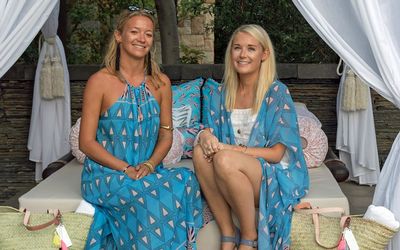Ethical African clothing hits the US market
by Eugene Yiga,
2016-02-17 05:47:55.0
WHEN Alice Heusser and Olivia Kennaway met while studying at a Cape Town fashion design school in 2004, they had no idea their friendship would create a company making waves across the continent.
"I had been to visit Olivia at her home in Kenya and we brought back some beautiful kangas (traditional East African cloth) from a market in Lamu," Heusser says. "Friends started asking if we could make them our trademark Lalesso skirts. That’s how the business started."
Setting up a business when young meant there were challenges and some hard lessons to learn. But Kennaway is grateful because it meant they could take risks out of "sheer naivety" that they can’t get away with today.
"Fashion is a multibillion-dollar industry and there’s little room for mistakes," she says. "Showroom fees are considerable and it’s a big risk to take not knowing what sales one will make until after the marketing period is over."
To operate in a competitive industry and stand out as a unique brand that is sellable is another challenge. What sets Lalesso apart is its focus on an ethical and transparent production process.
"We and our customers know where the garments were made and by whom," Heusser says. "Everyone involved in our production chain is treated fairly and paid a good wage. We use fashion as a form of upliftment and sustainable development."
Lalesso produces most of its garments in Maungu, a poor, remote rural part in Kenya. Kennaway remembers when the densely forested area was rich in wildlife. But with farming being a struggle, locals cut down trees for charcoal and poached animals for money or meat.
"In the factory, Wildlife Works stepped in to not only provide sustainable jobs, but to educate and raise awareness about antipoaching and deforestation," Kennaway says.
"The impact they are having on the greater community — they reach a radius of up to 300km — is incredible and inspiring. We also work with a local women’s group in the area who do all the beadwork embellishment detail on the garments. These grassroots projects are so important and make an impact in Africa."
With cheap imports putting the textile industry under pressure, tens of thousands of South African garment workers have been made redundant over the last 20 years. Lalesso now produces all its swimwear at a Cape Town factory that has the state-of-the-art machinery to provide the quality it needs.
"There are thousands of clothing factories where workers are treated poorly, made to work in unsafe areas, and paid a pittance," Heusser says. "This is all to supply an ever-growing demand for this fast, disposable fashion culture that we have become accustomed to.
"Not only is fast fashion often unethical, it is also damaging for the environment and is the second-biggest cause of pollution in the world.
"Consumers need to start looking to where their clothing is coming from and start to change their spending habits to buying ethically, locally, and for longevity," she says.
As part of its plan to diversify, Lalesso recently designed the luxury four-poster poolside cabanas at One&Only Cape Town, an urban resort at the V&A Waterfront.
Heusser and Kennaway found inspiration in the romantic airy daybeds in Lamu and are thrilled with the "African Boho luxe" results of their work.
"The Resort 2016 collection (an influence on the cabanas) was inspired by a combination of pastel palettes that complement one another," Heusser explains.
"The collection was also largely inspired by Hadithi, a Kenyan beading group we worked with. Their traditional beading skills were utilised in a contemporary context."
Next month, Lalesso will make its debut at Saks Fifth Avenue, an upmarket US department store.
"The showroom said no to us three years in a row, maintaining that they loved the brand but felt we weren’t ready," Kennaway says.
"We’re glad they made us wait, as failing back then would have ruined today’s chances. Today, we’re more confident in the brand than ever."
That persistence and confidence are crucial is one of the lessons Heusser and Kennaway have learned on their business journey. "There will always be times when giving up seems like the best option, but a positive attitude and mindset can get you a long way," Kennaway says.

Olivia Kennaway and Alice Heusser of Lalesso at the One&Only; resort in Cape Town. Their company designed the resort’s luxury poolside cabanas. Lalesso, produces its swimwear in Cape Town and focuses on an ethical and transparent production process. Picture: MANLEY COMMUNICATIONS
WHEN Alice Heusser and Olivia Kennaway met while studying at a Cape Town fashion design school in 2004, they had no idea their friendship would create a company making waves across the continent.
"I had been to visit Olivia at her home in Kenya and we brought back some beautiful kangas (traditional East African cloth) from a market in Lamu," Heusser says. "Friends started asking if we could make them our trademark Lalesso skirts. That’s how the business started."
Setting up a business when young meant there were challenges and some hard lessons to learn. But Kennaway is grateful because it meant they could take risks out of "sheer naivety" that they can’t get away with today.
"Fashion is a multibillion-dollar industry and there’s little room for mistakes," she says. "Showroom fees are considerable and it’s a big risk to take not knowing what sales one will make until after the marketing period is over."
To operate in a competitive industry and stand out as a unique brand that is sellable is another challenge. What sets Lalesso apart is its focus on an ethical and transparent production process.
"We and our customers know where the garments were made and by whom," Heusser says. "Everyone involved in our production chain is treated fairly and paid a good wage. We use fashion as a form of upliftment and sustainable development."
Lalesso produces most of its garments in Maungu, a poor, remote rural part in Kenya. Kennaway remembers when the densely forested area was rich in wildlife. But with farming being a struggle, locals cut down trees for charcoal and poached animals for money or meat.
"In the factory, Wildlife Works stepped in to not only provide sustainable jobs, but to educate and raise awareness about antipoaching and deforestation," Kennaway says.
"The impact they are having on the greater community — they reach a radius of up to 300km — is incredible and inspiring. We also work with a local women’s group in the area who do all the beadwork embellishment detail on the garments. These grassroots projects are so important and make an impact in Africa."
With cheap imports putting the textile industry under pressure, tens of thousands of South African garment workers have been made redundant over the last 20 years. Lalesso now produces all its swimwear at a Cape Town factory that has the state-of-the-art machinery to provide the quality it needs.
"There are thousands of clothing factories where workers are treated poorly, made to work in unsafe areas, and paid a pittance," Heusser says. "This is all to supply an ever-growing demand for this fast, disposable fashion culture that we have become accustomed to.
"Not only is fast fashion often unethical, it is also damaging for the environment and is the second-biggest cause of pollution in the world.
"Consumers need to start looking to where their clothing is coming from and start to change their spending habits to buying ethically, locally, and for longevity," she says.
As part of its plan to diversify, Lalesso recently designed the luxury four-poster poolside cabanas at One&Only Cape Town, an urban resort at the V&A Waterfront.
Heusser and Kennaway found inspiration in the romantic airy daybeds in Lamu and are thrilled with the "African Boho luxe" results of their work.
"The Resort 2016 collection (an influence on the cabanas) was inspired by a combination of pastel palettes that complement one another," Heusser explains.
"The collection was also largely inspired by Hadithi, a Kenyan beading group we worked with. Their traditional beading skills were utilised in a contemporary context."
Next month, Lalesso will make its debut at Saks Fifth Avenue, an upmarket US department store.
"The showroom said no to us three years in a row, maintaining that they loved the brand but felt we weren’t ready," Kennaway says.
"We’re glad they made us wait, as failing back then would have ruined today’s chances. Today, we’re more confident in the brand than ever."
That persistence and confidence are crucial is one of the lessons Heusser and Kennaway have learned on their business journey. "There will always be times when giving up seems like the best option, but a positive attitude and mindset can get you a long way," Kennaway says.




















Change: -0.80%
Change: -1.03%
Change: -0.24%
Change: -1.13%
Change: -1.10%
Data supplied by Profile Data
Change: 0.13%
Change: -0.23%
Change: -0.80%
Change: 0.00%
Change: -0.09%
Data supplied by Profile Data
Change: 0.04%
Change: 0.06%
Change: 0.09%
Change: 0.22%
Change: 0.00%
Data supplied by Profile Data
Change: -0.03%
Change: -0.20%
Change: 0.00%
Change: 0.17%
Change: 0.55%
Data supplied by Profile Data